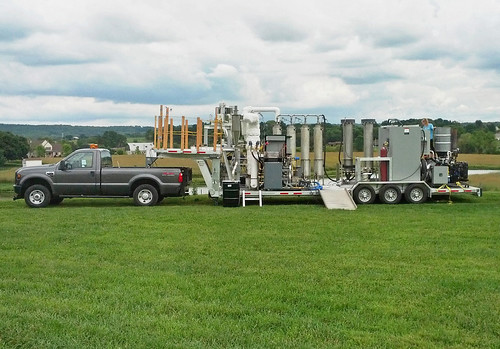
Agricultural Research Service scientists are testing a mobile pyrolysis system for on-farm production of bio-oil from agricultural waste. USDA-ARS photo by Mark Schaffer
The idea of replacing fossil-based fuel, such as petroleum, with a renewable energy source is enough to get any environmentalist excited. Now, Agricultural Research Service (ARS) scientists have advanced a process to produce crude liquid fuel called “bio-oil” from agricultural waste. The bio-oil is produced by a process called “pyrolysis,” which involves chemical decomposition of plant and other organic matter at very high heat without oxygen. This new technology for producing renewable fuels is called “tail-gas reactive pyrolysis” or TGRP.
The TGRP method might be considered a new generation of pyrolysis because it holds promise for processing and improving bio-oil as an intermediate product toward finished biofuel.
Formed from organic compounds subjected to intense heat and pressure over time, natural petroleum is removed from beneath sedimentary rock. Crude petroleum is treated in established refineries to produce gasoline and other products. The TGRP method provides use of new refining techniques that are similar to those currently being used at these petroleum refineries. TGRP is an important step toward the ultimate goal of producing cleaner bio-oils that can be distilled at petroleum refineries versus building new, specialized refineries.
Significantly, the Energy Independence and Security Act of 2007 calls for a minimum of 36 billion gallons of advanced biofuels to be produced in the United States by 2022. This effort will require, in part, the development of a new industry that produces 21 billion gallons of new biofuels from non-food sources.
Raw material called “biomass” is the basis for producing biofuel. The raw biomass material includes non-food-grade plant matter procured from agricultural or even household waste residue, including wood, switchgrass, and animal manure. A new high-output mobile processing unit can produce bio-oils from these materials at an accelerated rate. This is significant, because instead of shipping large amounts of agricultural waste to a refinery at high cost, the mobile unit converts the biomass into energy-dense bio-oil right on the farm.
The goal of using TGRP on the farm is to yield a higher-quality bio-oil that is more marketable to biofuel producers than bio-oil made from traditional pyrolysis methods. The research team is headed by ARS chemical engineer Akwasi Boateng, with the ARS Sustainable Biofuels and Coproducts Unit at the Eastern Regional Research Center in Wyndmoor, Pennsylvania.
No comments:
Post a Comment
Note: Only a member of this blog may post a comment.